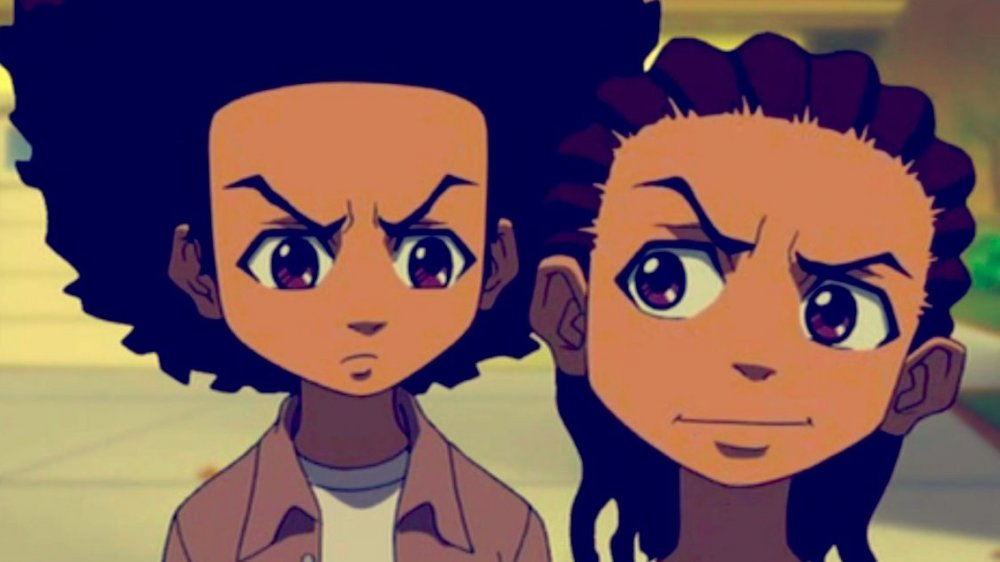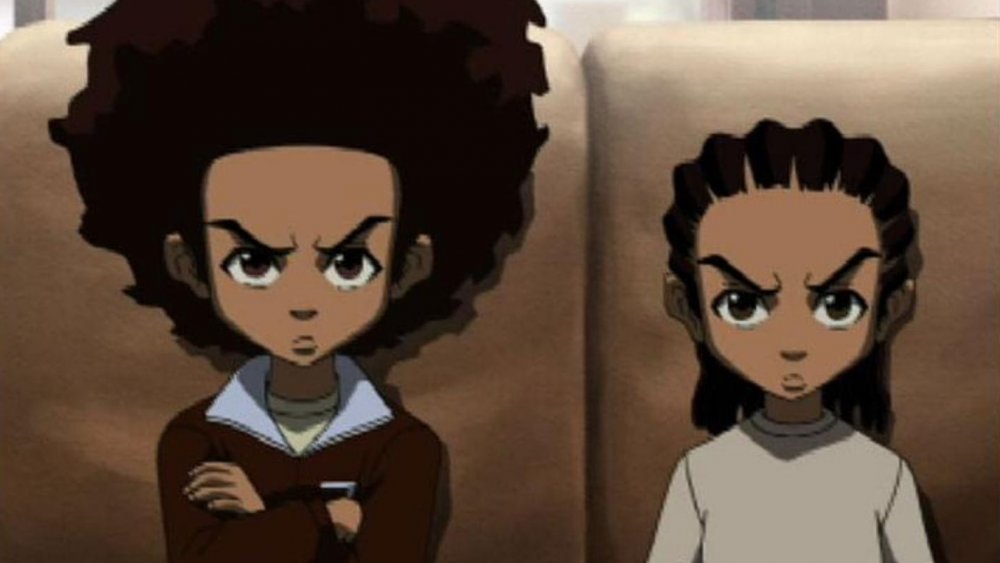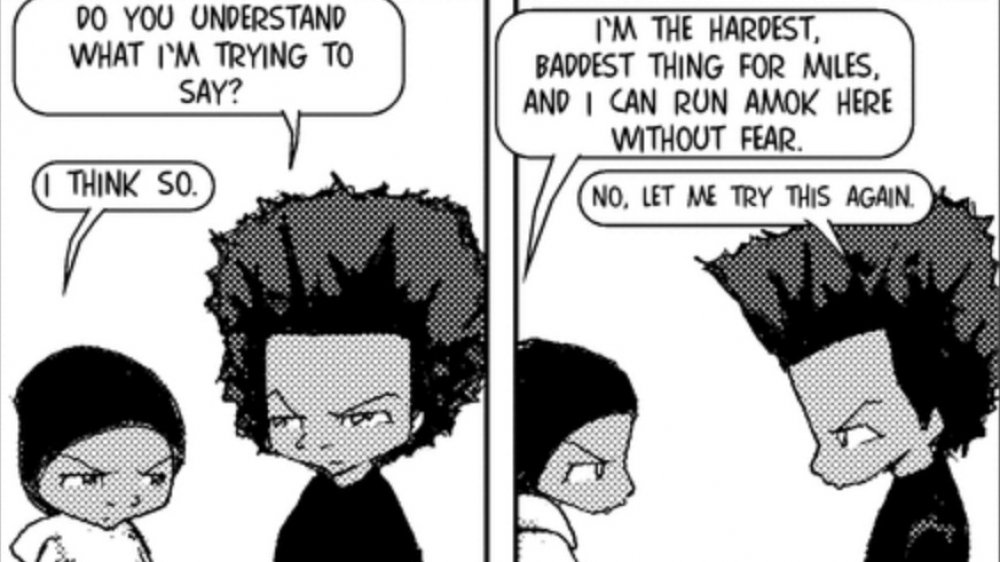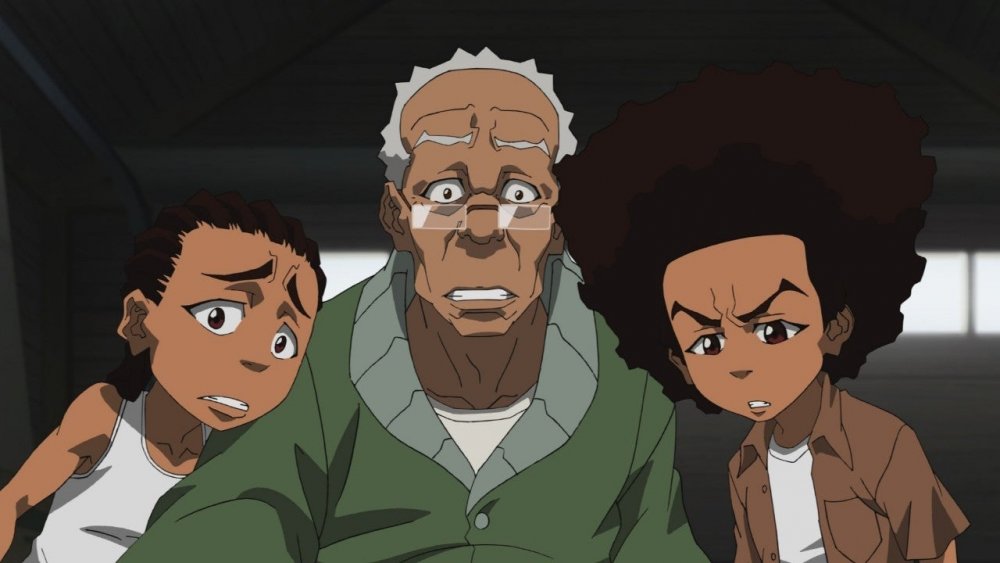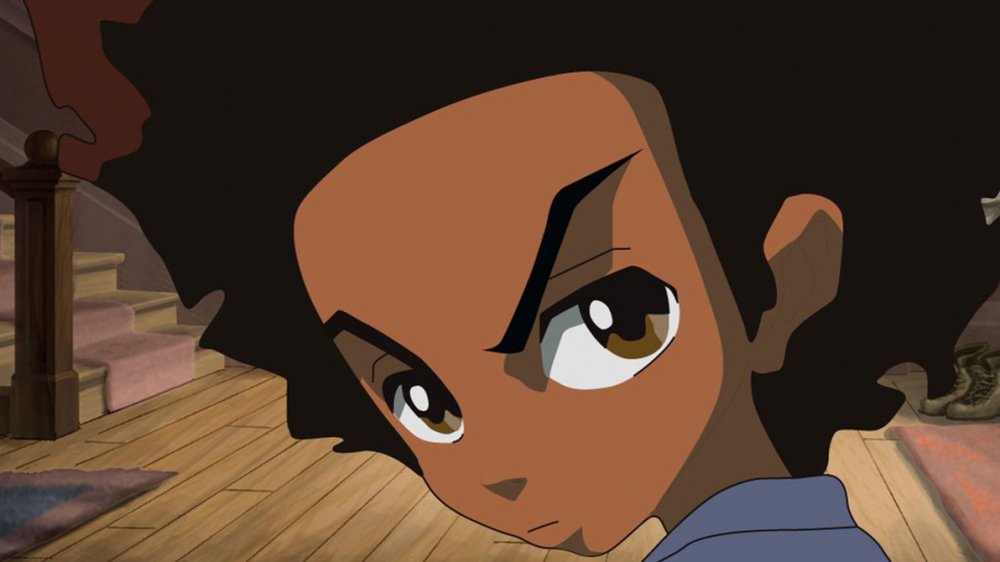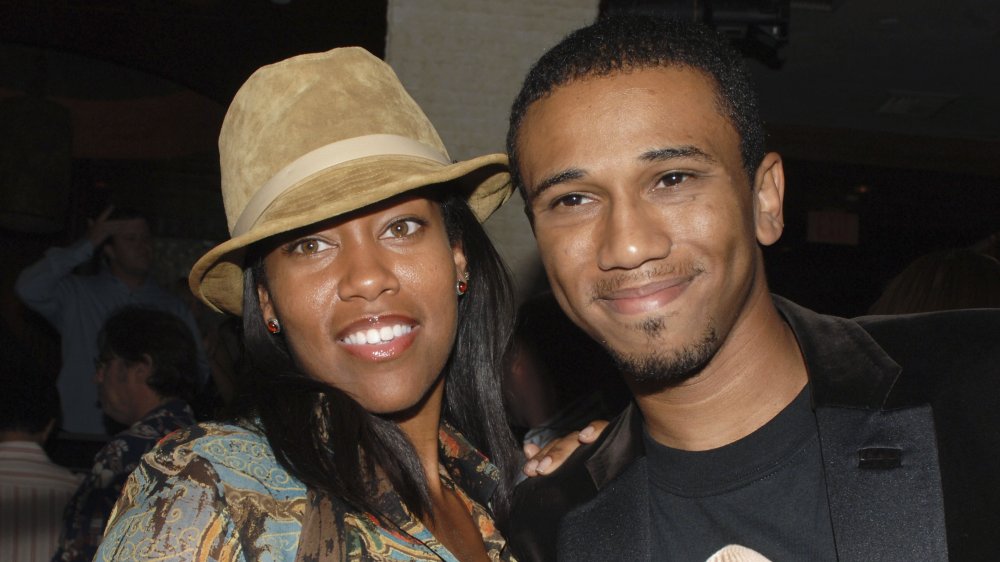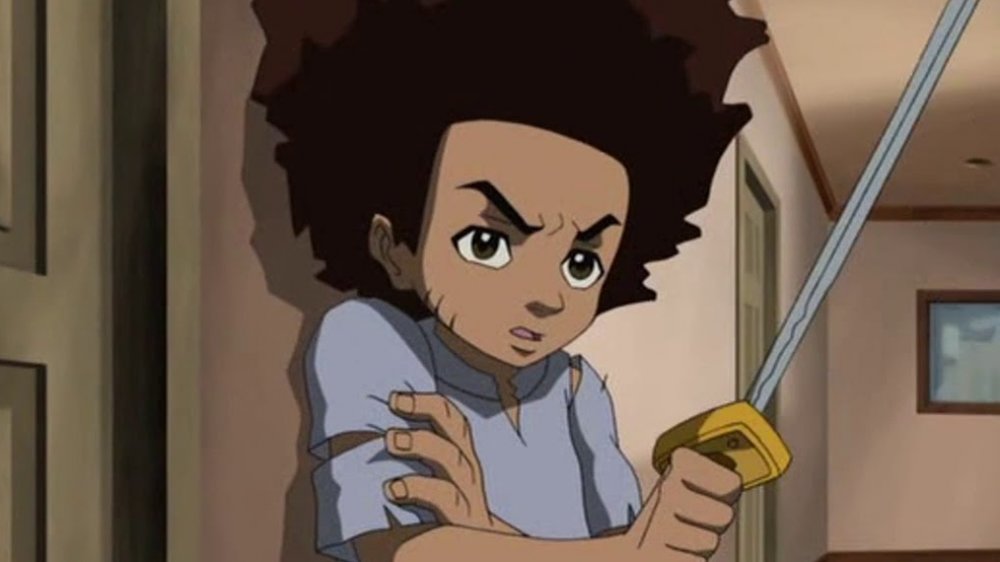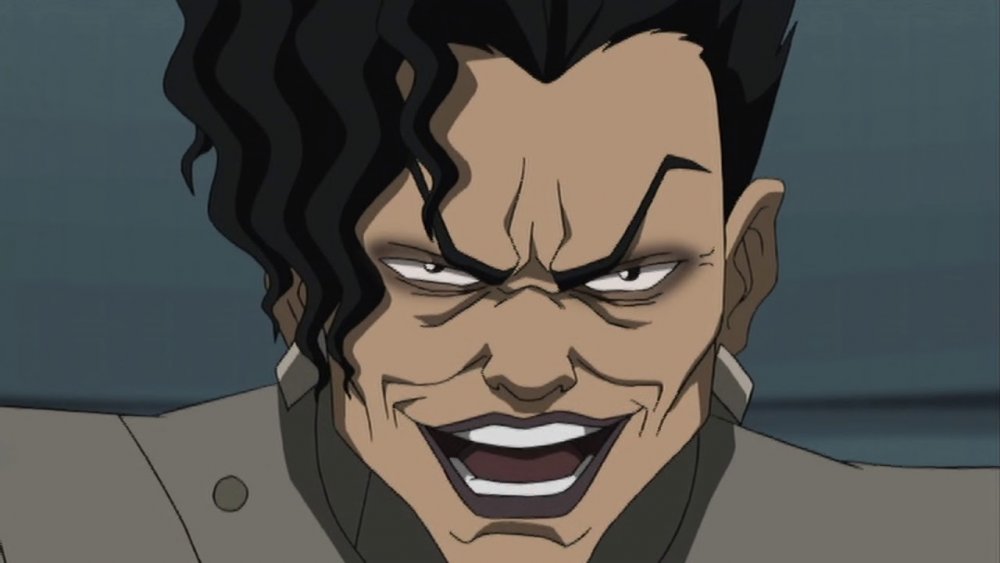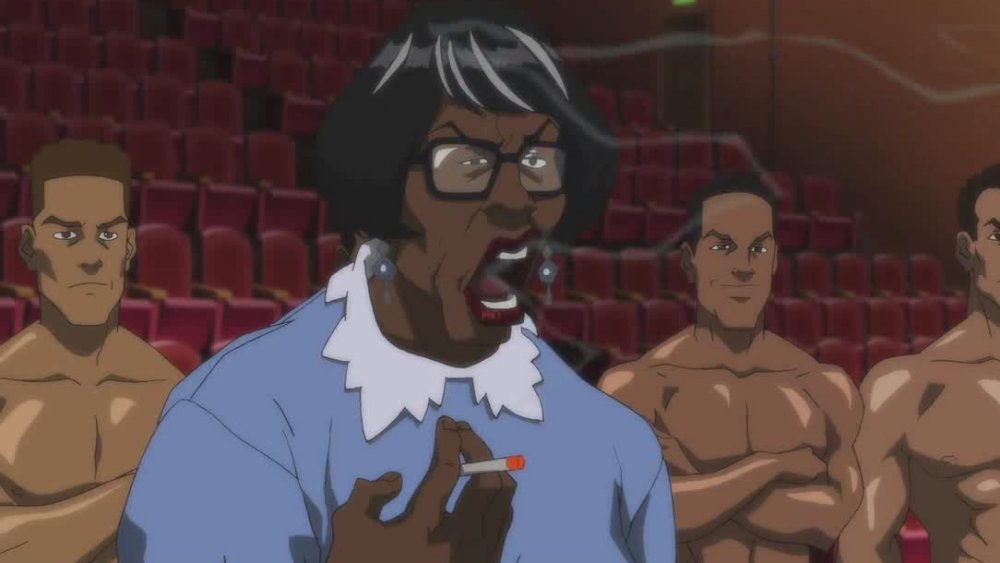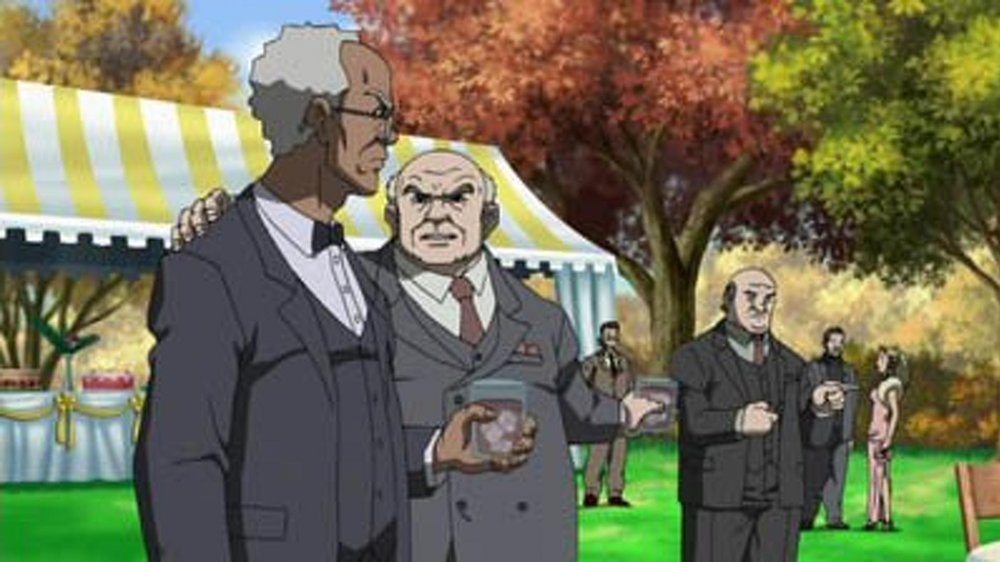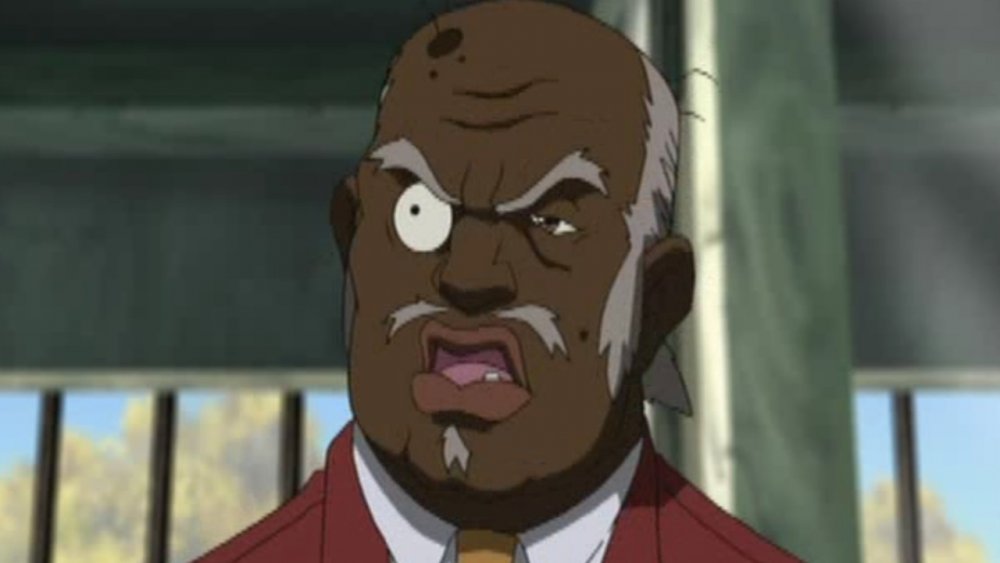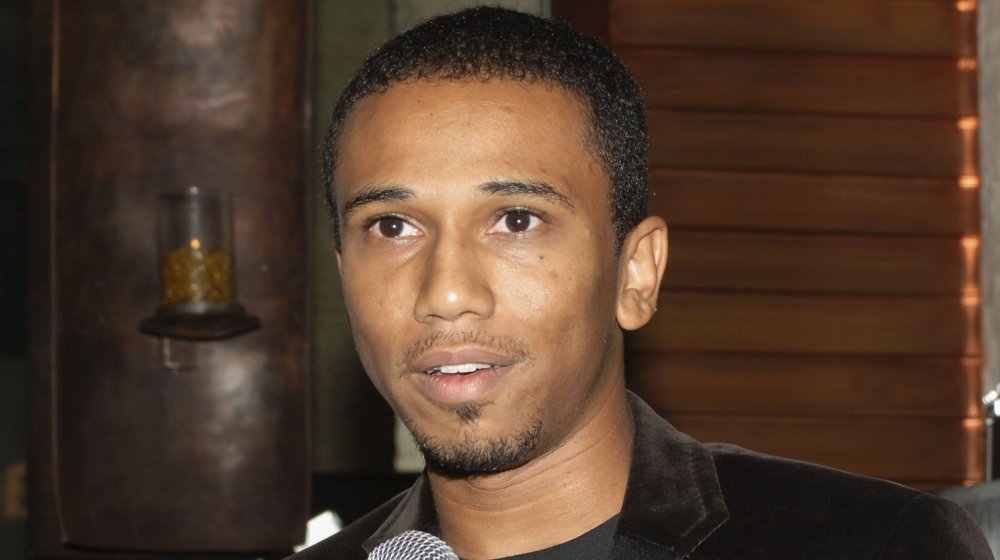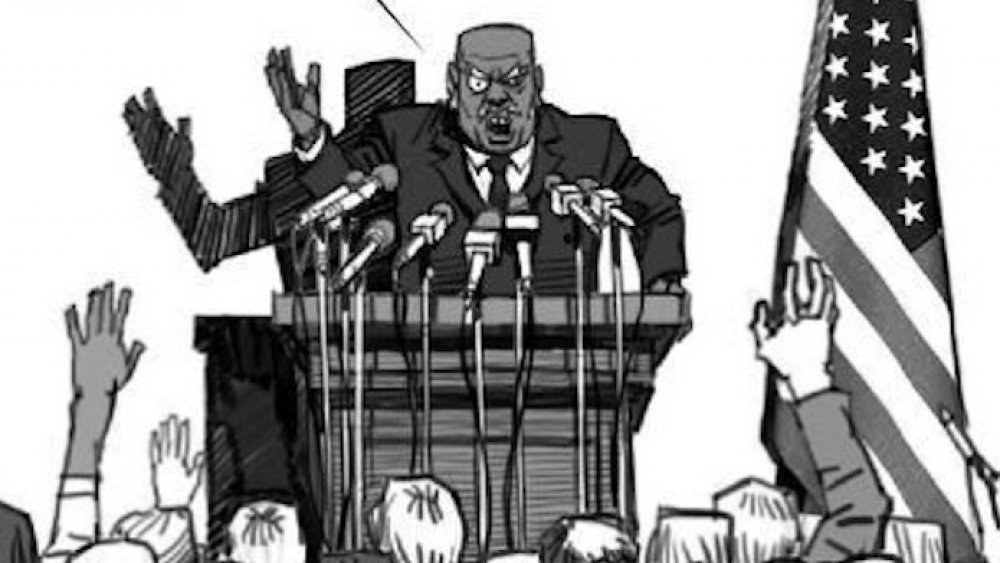The Untold Truth Of The Boondocks
In 2005, Adult Swim broke up its usual schedule of absurd cartoons and nihilistic sketch comedy with the thoughtful, provocative, and lushly animated adaptation of The Boondocks. The show revolved around the lives of the Freeman family — young, educated, bitingly funny Huey Freeman; his wannabe hardcore rapper little brother Riley; and their grandfather, Granddad, a cranky war veteran who didn't care for either boy's worldview. The African-American family lived in Woodcrest, an upper crust, primarily white suburban enclave (the Boondocks, in other words), a setting through which creator Aaron McGruder could discuss, criticize, and intellectually destroy politics, race relations, public figures, and popular culture, particularly African-American pop culture.
The brutally funny and caustic series spoke truth to power and pointed out society's most toxic ills, and it was all carried over from the popular newspaper comic strip created by McGruder. And if you want to know more about McGruder's animated masterpiece, here's the behind-the-scenes story of The Boondocks — the comic strip, the cartoon series, and its legacy.
How The Boondocks began
Long before The Boondocks was a hit animated series, it was a nationally syndicated comic strip. But before that, it was but a humble strip in a college newspaper. And still prior to that, it was an early webcomic, debuting as a regular feature in February 1996 on the early (and now defunct) music website The Hitlist Online. After gaining a toehold there, Aaron McGruder pitched it to The Diamondback, the student newspaper of the University of Maryland, where the cartoonist, still just in his early 20s, was an undergraduate studying African-American studies.
McGruder's per-strip pay from The Diamondback was a mere $30, although that was more than double the publication's usual comics fee of $13 per installment. After a couple of months, music magazine The Source had picked up The Boondocks, too. However, the strip would ultimately run in the college newspaper for just about three month. It ended when a printing error had left an installment out of an issue, replaced by the words "Oops." McGruder, incensed over this — and how he was never given a proper explanation or apology from his editors — pulled the strip.
It had a hard time getting into big newspapers
In 1997, not long after Aaron McGruder pulled The Boondocks from his college newspaper, he submitted his strip to syndicates, companies that provide comics, puzzles, and advice columns to hundreds of newspapers. At the time of The Boondocks' creation, there were nine major syndicates, and according to The Washington Post, McGruder approached seven. The rejections piled on, with the syndicates feeling that The Boondocks was too edgy or incendiary for the otherwise toothless comics section of the average newspaper. Of the major comics distributors, only Universal Press Syndicate showed any interest in The Boondocks, but even then, it took its sweet time. The strip didn't debut as a national newspaper feature until April 1999, two years after McGruder first shopped it.
And then, The Boondocks didn't really run for all that long. In a world where Peanuts ran for 50 years and Garfield is more than 40 years old, McGruder gave his strip seven years. In 2006, McGruder announced he was taking a hiatus from The Boondocks, ostensibly to focus on the Adult Swim animated adaptation. By the end of the year, the break was made permanent. "I got sick of the strip and sick of politics," McGruder said during a speech at the University of South Florida (via The Comics Reporter).
The Boondocks was heavily censored
At its peak in the mid-2000s, The Boondocks was one of the most widely distributed strips of all time. After one of the biggest debuts in syndication history (nearly 200 outlets carried the strip in its first year), the strip ran in around 350 newspapers in the U.S. alone. Not only was it one of the most read comics ever, The Boondocks was easily among the most censored, too. Some newspapers, notably The Atlanta Journal-Constitution, tried to quell the impact of the strip, choosing to run it not on the funny pages but deep in the editorial section.
In the post-9/11 era of fervent American patriotism, Huey Freeman spoke out on the dangers of such extreme sentiment, pointing out how so many were distracted that they didn't notice an erosion of civil liberties in the name of national security. Major papers like Newsday, the New York Daily News, and The Dallas Morning News placed the strip on its editorial page, while other publications didn't run the strips in question at all. They had a similar reaction when the strip took opposition to the war in Iraq and when it used a variation of the "N-word."
Multiple artists have drawn The Boondocks
The vast majority of newspaper comic strips are the work of one individual, a single creator-cartoonist who writes the text and draws the art. The occasional writer/artist duo will sometimes emerge, but The Boondocks has actually employed several artists over the years. Running off and on over the course of two decades, creator Aaron McGruder has always been the writer, and he drew Huey, Riley, Granddad himself from the strip's mid-'90s inception up until 2003, passing along primary art duties to Boston illustrator Jennifer Seng so as to refocus his efforts. "If something had to give, it was going to be the art," McGruder told The New Yorker. "I think I'm a better writer than artist."
About a year later, Seng stepped out, and in stepped Carl Jones to help McGruder generate the visual artwork for The Boondocks. Jones would bring a lot more to the brand than just that, as he would also serve as co-executive producer on Adult Swim's The Boondocks adaptation and voicing (among others) rapper Thugnificent, a Ludacris-esque recurring character
The Boondocks, starring Regina King and ... Regina King
Part of what makes The Boondocks, the animated series, so special is its voice cast. The main characters are young siblings Huey and Riley Freeman. The two are quite different — Huey is politically informed, well-read, and hyper-intelligent, while his little brother Riley is obsessed with rap music and hip-hop culture. The two feel like they're related, though, in part because their voices bear an underlying similarity, a feat achieved by having the same actor play both roles.
Academy Award winner and Watchmen star Regina King voices both Freeman boys. And that's a happy accident. Initially, producers sought out different performers to play each part. "I originally was only playing Riley," King said in Boondocks DVD featurette. But then King read Huey's lines, and the showrunners couldn't find anybody who could top King's take on the character, and they hired her to play both boys.
It took years for the series to hit TV
The Boondocks began life as a comic strip, and proving its success in that medium, it followed predecessors like Peanuts and Garfield into animated television. However, that wasn't a fringe benefit or the natural result of expansive popularity. McGruder had intended for The Boondocks to be a TV show when he formulated the idea, and a strip was a means to an end. "I figured that no one would give me a show without a strip," McGruder told the Chicago Maroon.
Still, even with a well-known comic as source material, McGruder struggled to get a show made. According to an interview with The A.V. Club, McGruder unsuccessfully attempted to sell the show for "over five or six years" before selling the idea to Sony Pictures Television. "The deals basically just didn't happen for a number of reasons," McGruder told the Tacoma News-Tribune, "but most of them revolved around, you know, creative control issues and things like that." Fox contracted McGruder to make a pilot episode, but then they declined to order a full series. That's when Adult Swim jumped in and bought the show, debuting it in 2005.
How an Adult Swim show gets banned by BET
When The Boondocks was in the works as a show at Fox, filmmaker Reginald Hudlin, best known for directing House Party and Boomerang, helped creator Aaron McGruder develop the project. And interestingly, he retained an executive producer credit through the first two seasons of The Boondocks during its Adult Swim years. That was an obligated relic of his work on the Fox incarnation because he didn't work on the show after that. "We don't have a partnership anymore," McGruder told The A.V. Club of Hudlin in 2005. "He is now running BET, and I have not spoken with him in over a year."
However, McGruder did address Hudlin's employer on The Boondocks. In the second season, the show took aim at Black Entertainment Television, calling it out as a harmful force to the African-American community. In fact, one episode shows BET executives actively conspiring toward "the destruction of Black people." Plus, at one point in the show, Huey Freeman boycotts BET and stages a hunger strike. In another episode, the viciously anti-Black character Uncle Ruckus gets a reality show on BET.
According to the Los Angeles Times, when executives at the real-life channel heard about these episodes, they called Turner Broadcasting (parent company of Adult Swim) and Boondocks studio Sony Pictures Television and insisted they not be broadcast, threatening a lawsuit. Neither "The Hunger Strike" nor "The Uncle Ruckus Reality Show" originally aired on Adult Swim in the US, and American audiences first saw them on a Boondocks DVD set.
The Boondocks upset Tyler Perry
As creator of The Boondocks, strip and show, Aaron McGruder was one of the most powerful and influential Black voices of 21st-century culture, not unlike like Tyler Perry, the writer, actor, and TV series creator best known for his morality dramedies starring himself as an old woman named Madea, as well as his TBS sitcoms House of Payne and Meet the Browns. Interestingly enough, TBS falls under the Turner corporate umbrella, as does The Boondocks' former home of Adult Swim.
So that made things interesting in 2010 when the Boondocks episode "Pause" (co-written by McGruder) hit the airwaves. In this particular tale, Granddad auditions to be in a play written by "Winston Jerome" called Ma Duke Finds Herself a Man, in which Jerome also dons drag to play the elderly Ma Duke. Along the way, Jerome propositions Granddad, and viewers learn that the guy's whole deal is that he uses religion and drag to hide the fact that he's gay.
The real Perry took offense and objected to his and McGruder's mutual bosses at Turner. According to the Los Angeles Times, Perry was so upset that he told Turner executives that he might take his business to another network. It could've been even more incendiary. When McGruder turned in the script, higher-ups forced him to change the name of the Tyler Perry-like character after his first attempt sounded too close to "Tyler Perry," and then had him bury it deep in the season instead of his initial intent to make it a highly publicized season premiere.
Where are the Boondocks, exactly?
Like The Simpsons and Springfield, The Boondocks derives plenty of satirical fodder from its location — a fictional suburb called Woodcrest. Also like Springfield, it's not entirely clear just where exactly Woodcrest is, in terms of state. It's a significant source of fan speculation and debate, and adherents to each of the major theories have proof to back up their opinion.
Some think Woodcrest is a suburb of Baltimore, because that's where the comic strip was set. In a March 2000 installment, Huey reveals his area code is 443, a Maryland prefix. Also, the show's entire premise mirrors that of creator Aaron McGruder's childhood experience of moving from Chicago to Columbia, Maryland. And in the episode "Pretty Boy Flizzy," there's a mention of the concert venue Woodcrest Post Pavilion, a play on Columbia's real-life Merriweather Post Pavilion.
Admittedly, it would be tough for the Freemans to live in Chicago because they fly back to the Windy City, their former home, to attend a funeral in the episode "Wingmen." Still, many Boondocks viewers believe the show is set in Chicago. In an episode about the criminal trial of notable Chicago resident R. Kelly, Riley asks Granddad if he'll take him "into the city" to watch it. Granddad tells him to walk, and Riley protests, saying, "It's 40 miles!"
There was supposed to be an Uncle Ruckus movie
While main character Huey Freeman says a lot of things on The Boondocks that could be considered controversial (the first episode begins with his assertion that "Ronald Reagan was the devil"), the most polarizing figure in Aaron McGruder's fictional universe is Uncle Ruckus, a rude, crude, elderly man who's viciously racist against Black people, despite being Black himself, something which he audaciously denies. McGruder and Boondocks TV writers use the character as one of their most powerful satirical tools, to expose and explore the notions of systemic and self-internalized racism.
But if you're looking for proof that an appreciation for Uncle Ruckus isn't universal among the large fanbase of The Boondocks, well, then you should know that plans for a spinoff movie featuring the character totally failed. In January 2013, McGruder started a Kickstarter in hopes of raising $200,000 in seed money for a live-action Uncle Ruckus movie starring Gary Anthony Williams, the actor who voices the character on the animated series. Only slightly more than 2,600 people donated to the project, which fell short of its financial goal with about $130,000 raised. That movie was never made, and neither was a more general Boondocks big-screen movie, which show star Regina King discussed on Sway in the Morning in 2012.
Aaron McGruder walked away from the TV show
No matter the medium, Aaron McGruder always kept a watchful eye over The Boondocks, both the original comic strip and the TV show that he created, executive produced, occasionally acted in, and composed music for. He also took his time. New episodes of The Boondocks could take ages to arrive, with 18 months passing between the end of season one and the beginning of season two and four years between seasons three and four.
McGruder's attention to detail and his slow and steady pace frustrated his bosses at Adult Swim. According to the Los Angeles Times, "a mutually agreeable production schedule could not be reached," and in March 2014, just before the fourth season premiere, Adult Swim announced that McGruder had left the show and the upcoming batch of episodes had been made without his input. His name had even been removed from The Boondocks, even his "created by" credit. McGruder announced his departure on Facebook. "Huey, Riley, and Granddad were not just property to me," he wrote. "They are my fictional blood relatives. Nothing is more painful than to leave them behind."
Back to The Boondocks
The Boondocks in either of its forms — multi-paneled comic strip or animated series — hasn't been around in a while. Aaron McGruder stopped producing the strip in 2006, while the last original episodes of the Adult Swim show aired in 2014.
Fortunately, in 2020 — a period marked by a significant, fractured, and tumultuous political climate in need of satirizing and comment — McGruder brought back The Boondocks without warning. In February 2020, a half-dozen strips appeared on, of all places, the Instagram account of nationally known radio host Charlamagne tha God. McGruder took aim at Donald Trump, likening the scandal-plagued president to the Boondocks' Uncle Ruckus, as well as firing shots at R. Kelly and MSNBC.
And there's good news for fans of the show, as later in 2020, there will be a reboot of the series. Upstart streamer HBO Max ordered two seasons worth of new Boondocks episodes, adding 24 to the Adult Swim package of 55, which the service also acquired and put into circulation.
